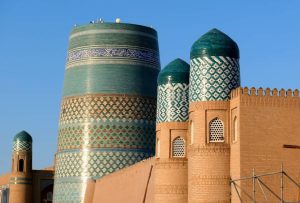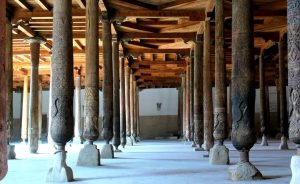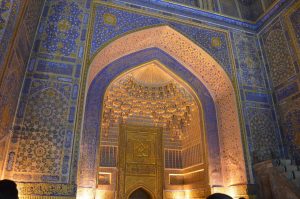

Uzbekistan – the country in the middle of Central Asia was one of the main stations along the Silk Road, and due to that, the area became a center for science, art, craft, and trade. Central Asia was invaded by different dynasties: Persians, Greeks, Chinese, Arabs, Mongols, etc. Every nation took something from here, and for sure, they left as well. Most part of Central Asia was desert that’s why nomadic way of living was quite common here.
Nowadays, in Central Asia, you can find five Stan countries as Uzbekistan, Tajikistan, Kazakhstan, Kyrgyzstan, and Turkmenistan.
Uzbekistan was an area with not only deserts but also mountains and rivers, valleys, and waterfalls, which meant people had an opportunity to have a settled way of living. This is one of the main reasons why about 90% of historical monuments of Central Asia are found in the territory of Uzbekistan nowadays.
In Uzbekistan, you discover so many unique ancient historical sights, colorful bazaars, beautiful handicrafts full of patterns with philosophy, and Oriental art as well.
Everything people do here is based on traditions they learned from their ancestors, and they consider it the responsibility of every family to give it to their young generation. This is how traditions have been going from generation to generation.



If you visit Uzbekistan’s majestic buildings and rich history, it makes you believe how strategically important the area was in Uzbekistan in middle age times along the International network of trade routes.
Samarkand, Bukhara, Khiva, Tashkent, Margilan, Rishtan, Gijduvan, and Urgut cities and towns were big centers for science, art, and craft, trade according to research, historical sources and rich heritage what you can find in buildings and lifestyle of the locals. Even in different periods, different cultures were spread still, colorful traditions and customs remind us a lot about Persian culture and Zoroastrian traditions. Even the name of the city Bukhara originated from the word “Vihara”- meaning Buddhist temple, but later the city became a major center for Islamic science and theology and still is known as one of the holiest cities in the Islamic world. Or locals still speak Tajik which is a dialect of the Persian language, which was the dominant language till the coming Bolsheviks in the early 20th.c.
People in Uzbekistan say that knowing and speaking different languages is in our blood because we were born in the area, which was a junction of the Silk Road. That’s why even the Tadjik language is not taught at schools, but it is still popular among the locals in many areas of modern Uzbekistan. Local people speak Russian well, too, due to the Soviet period.
In modern Uzbekistan, yes, the young generation still has a deep interest in learning languages as they want to revive those routes of the Silk Road in a modern way by taking into consideration modern opportunities and creating 3rd Renaissance periods by researching and learning from two renaissance periods we had in old times. If you research Silk Road history or if you visit Uzbekistan, you will get acquainted with people who made great contributions to the civilization of the world, maybe some names I remind you now you have already heard:
Mukhammad Musa Al Khorazmi – Greatest mathematician from whose name the word “algebra” or “Algorithm” came from.
Abu Ali Ibn Sina or Avicenna – whose book “Canon of Medicine’’ was the main textbook for Oriental and European physicians till the 19th.c.
Abu Rayhan Beruny was who first created the model of the Globe by researching in the fields of astronomy, Geography, Geodesy and Cartography. All these people were members of the first Renaissance period, which was
9-10th.c.
The second renaissance results in you seeing the historical buildings of Bukhara and Samarkand during your visit, and the reason was great statesman and conqueror Temur the Great and his generation as Ulugbeg, Babur, Alisher Navoi, Ali Kushchi, and many others.
The most important you find in Uzbekistan is HOSPITALITY – It is quite a big feature of the Uzbeks and Central Asian people. Tolerance is at a high level in the society in Uzbekistan as well. If you knock at the door, you are warmly welcomed, and without asking, they serve warm tea and sweets to you, and doesn’t matter what is your nationality, belief, or country. It is a big tradition in Uzbekistan as this way they wish you – to their guests their warm and sweet wishes…
At the end I would like to share with you a beautiful legend about my country.
The story says that God invited one representative from each nation he created on the Earth to give them a piece of land where they could live, and representatives came to God; they stood in a long queue next to each other and entered God and were taking their piece of land to live. When it came to the turn of the representative of Uzbek nation, the guy who was standing behind him kindly asked to get his turn before the Uzbek guy as due to something, he was in a hurry, and the Uzbek guy didn’t resist and gave his turn. This way, everyone else went on his own turn, and the Uzbek representative turn came last. When he entered God as a last one, the Almighty asked why he gave his turn to someone else, as no piece was left for him. A representative from the Uzbek nation said that as the guy was in a hurry, he decided to give his turn and considered that this way he did good to someone. Hearing that, God said to Uzbek: you have a good heart and attitude towards my creations. I will reward you for that and give to your nation a piece of paradise.
That’s why we Uzbeks consider our country as paradise on Earth, and that’s why we have 4 beautiful seasons, mountains, deserts, valleys and rivers, hospitable people and rich history, colorful culture, and the main wonderful People!!!
We, Uzbeks, wish everyone stay blessed!
This article was written by Nilufar from Bukhara, Uzbekistan. Travel has a unique way of connecting people, opening our eyes to new perspectives, and celebrating the rich tapestry of cultures our world offers. It was during one such journey in the enchanting city of Bukhara that we had the pleasure of meeting Nilufar, a local with a passion for sharing her heritage. Nilufar isn’t just any local; she’s a friend we were fortunate enough to make while exploring her hometown’s winding streets and vibrant history. With her own tour guide service, she became our gateway to understanding the beauty and depth of Bukhara’s culture. Her kindness wasn’t just in the stories she shared but in how she made every site come alive with personal anecdotes and historical insights. As she guided us through the architectural wonders and serene landscapes of her land, we realized we were not just tourists but learners of a living, breathing culture. Nilufar’s warmth and expertise were instrumental in making our visit an unforgettable journey of discovery. We believe that friendships like these are the soul of travel, and we hope to maintain this connection for a lifetime. If you ever find yourself in Bukhara, eager to explore and understand its beauty, reach out to us. We would be delighted to connect you with Nilufar, a friend who can turn your visit into an extraordinary adventure.